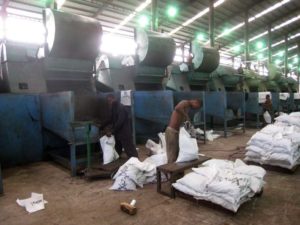
The condition in the country has taught these youths to be thankful for their situation and count themselves fortunate to be employed, no matter how terrible the working condition in their places of work is.
Some of them told our correspondent that they were aware that their case was ‘voluntary slavery;’ but said they had become powerless as a result of the economic hardship in the country.
“I don’t want to lose my job please, I cannot lose this job. My wife is pregnant. The survival of my family and I depends on the N15,000 I earn here per month,” Abbas said.
He tried to explain the reason why he had to be vigilant as he met with our correspondent some distance away from one of the factories of Lifemate Furniture, where he works on Oregun Road, Lagos.
Lifemate is one of the numerous businesses run by Chinese nationals in the country.
For Abbas, work begins at 8 a.m. and ends at 5.30 p.m.
Abbas’s appearance was nothing close to what one could describe as good. His mien portrayed a man facing rough times.
“I finished secondary school but I had no means to further my education,” the 31-year-old man said.
His work involves lifting heavy materials as he has to carry chunks of marble and other materials used for the high-end products churned out from the company’s factory everyday.
Abbas said, “This job is slavery, there is no other way to describe it. In fact, the company only started paying N15,000 recently. Our salary was N12,000 before. But where else do I go if I leave this job? Even if I find another factory work somewhere else, it is not likely that it will pay better.
“We hear from many other factory workers around. Their bosses pay terrible wages as well. It is usually like that in Chinese factories,” he added.
Foreign investment or foreign slavery?
China is one of the biggest investors in Africa. In fact, recently, the outgoing Chinese Ambassador to Nigeria, Deng Boqing, said the trade volume between Nigeria and China in 2013 was almost $13 billion.
“We encourage the Chinese companies to do their business, especially establishing factories in Nigeria in order to increase job opportunities for Nigerians and industrialize products for Nigerians,” the envoy had said.
But stories abound how badly expatriate employers treat locals in the country.
Tade Babatunde, a 30-year-old former employee of Lifemate, claimed he developed a recurrent chest pain as a result of lifting heavy materials while in the employ of the company. He was fired a few months ago.
He told Saturday PUNCH, “The first time I took permission to go for treatment since the company does not have a health insurance, N5,600 (about $36) was deducted from the N26,000 (about $167) I earned monthly. I was so shocked because I had thought my bosses would be considerate. I earned N26,000 because I had spent more than three years in the company.”
Read the full story at punchng.com


